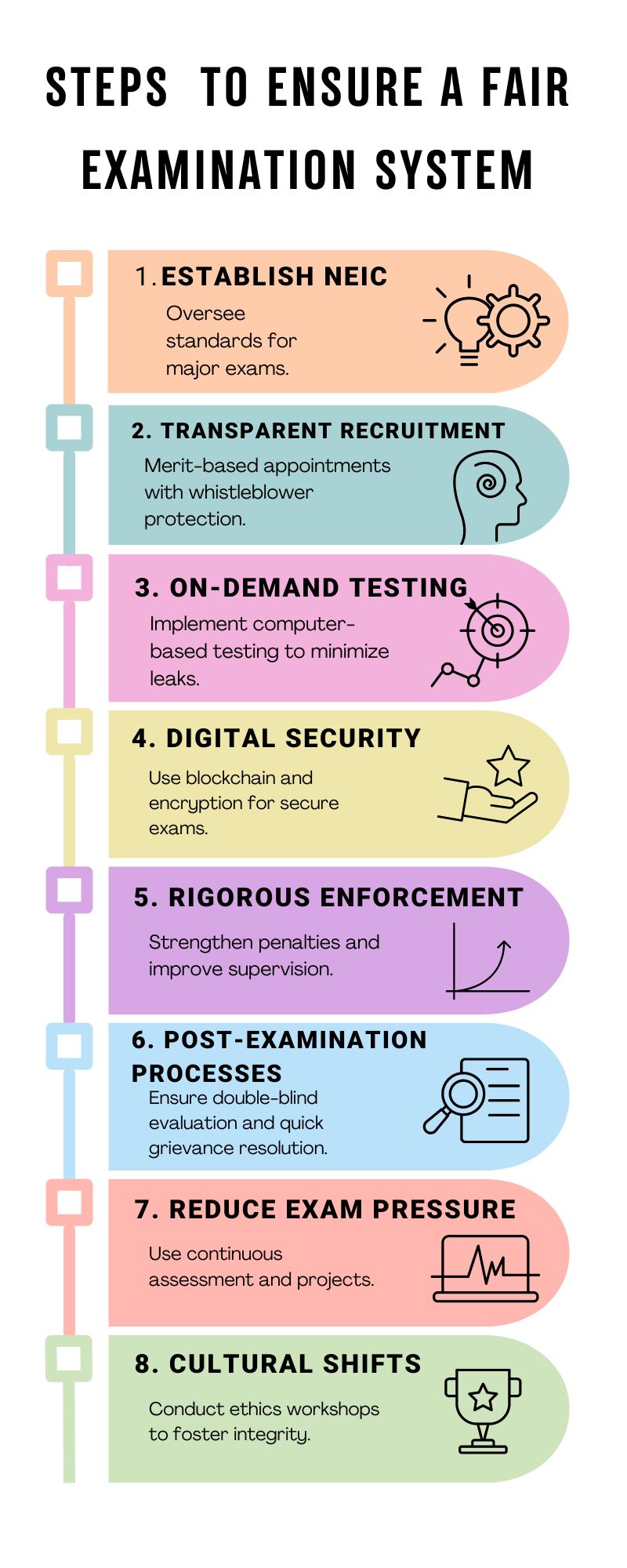The recent NEET controversy surrounding the National Eligibility cum Entrance Test (NEET-UG) has highlighted significant issues in the integrity of India’s examination system. Allegations of paper leaks and misconduct have cast a shadow over one of the country’s most critical medical entrance exams. This editorial explores the need for stringent Standard Operating Procedures (SOPs) to ensure transparent and fair examinations across India.
Origin of the Article
This editorial is based on “Preventing another NEET fiasco” which was published in The Hindu on 26/06/2024. The article examines the allegations of misconduct and paper leaks during the National Eligibility cum Entrance Test (NEET-UG) and advocates for the implementation and compliance of comprehensive Standard Operating Procedures (SOPs) to ensure a transparent examination system in the country.
Relevancy for UPSC Students
Understanding the issues around NEET-UG and the proposed solutions is crucial for UPSC aspirants. This topic is directly relevant to GS Paper 2, covering education, governance, and transparency. It helps in understanding the mechanisms of fair examination systems and the role of government agencies, aiding in comprehensive exam preparation.

Why in News
The NEET-UG controversy has brought to the fore critical issues of examination integrity and transparency, vital for UPSC aspirants to understand. With the Union Government’s response and Supreme Court’s intervention, the topic connects directly to previous UPSC questions on governance, transparency, and educational reforms, making it a timely and relevant subject for comprehensive analysis.
National Eligibility Entrance Test (NEET-UG)
NEET-UG is a pivotal medical entrance exam in India, conducted annually by the National Testing Agency (NTA) for admission to undergraduate medical courses. It plays a crucial role in the Indian education system, ensuring standardized assessment for aspiring medical professionals.
About NEET
NEET-UG is a national-level medical entrance exam conducted by the NTA for admissions into undergraduate medical courses such as MBBS, BDS, and AYUSH programs.
Conducting Body
Initially, NEET-UG was conducted by the Central Board of Secondary Education (CBSE). However, in 2018, the responsibility was transferred to the National Testing Agency (NTA).
Exam Details
The exam is conducted in 11 languages, including English, Hindi, and regional languages. It covers courses like MBBS, BDS, AYUSH, and BVSc & AH.

National Testing Agency (NTA)
Established in 2017, the NTA is an autonomous and self-sustained testing organization responsible for conducting entrance examinations for higher educational institutions in India.
About
The NTA was established as a Society registered under the Indian Societies Registration Act, 1860, to conduct entrance exams for higher education.
Entrance Exams
NTA conducts major exams like JEE-Main, NEET-UG, and CUET for undergraduate admissions, along with exams like UGC-NET and CSIR UGC-NET for postgraduate admissions.
Governance
NTA is governed by a Chairperson appointed by the Ministry of Education, with a Director General as the CEO. It follows directives from the Government of India and its General Body.
Functions
NTA identifies partner institutions, creates question banks, collaborates with international organizations, and conducts various other entrusted examinations.
NEET-UG Result 2024 Controversy
The NEET-UG 2024 results were marred by allegations of misconduct, including paper leaks and unusually high scores, raising concerns about the integrity of the examination process.
Allegations of Misconduct
Aspirants raised issues such as grace marks awarded to over 1,500 students, an unusually high number of perfect scores, and allegations of a leaked question paper.
NTA’s Stance
The NTA attributed the increase in high scorers to a larger pool of candidates and the relative ease of the 2024 exam. Compensatory marks were given for loss of time.
Supreme Court’s Ruling
The Supreme Court ordered a retest for 1,563 students who were given grace marks. The retest was conducted on June 23, 2024, without halting the admissions counseling process.
Government Stance
The government formed a high-level committee to investigate the NTA’s functioning and removed the NTA chief. The CBI took over the investigation following evidence of a paper leak.
PESTEL Analysis
| Political: The involvement of the National Testing Agency (NTA), established by the Ministry of Education, and the introduction of The Public Examinations (Prevention of Unfair Means) Act, 2024 highlight the government’s role in managing educational standards and ensuring fairness in examinations. The Supreme Court’s intervention and the dismissal of the NTA chief underscore the political pressure and legal scrutiny surrounding educational governance. Economic: Frequent exam malpractices and the need for retests impose financial burdens on the administration and candidates. Implementing stringent security measures like blockchain and encryption technology will entail significant costs but are crucial for maintaining the credibility of the examination system, which directly impacts the nation’s educational investments. Social: The integrity of NEET affects social trust in the educational system. Frequent leaks and unfair practices can demoralize students, affecting societal perceptions of meritocracy and equality in educational opportunities, as enshrined in Articles 14 and 21A of the Constitution. Technological: The recommendation for computer-based testing and the use of advanced security technologies like blockchain reflect a shift towards digitalization in managing examinations. These technologies aim to enhance security and transparency but require robust infrastructure and familiarity among all stakeholders. Environmental: While not directly impacted, the move towards digital exams could reduce the environmental footprint by minimizing paper usage and logistical movements associated with traditional exams. Legal: The establishment of The Public Examinations Act, 2024, introduces legal frameworks to combat cheating with severe penalties for malpractice. This legal reinforcement is critical to uphold the lawfulness of educational assessments and ensure compliance across various jurisdictions. |
Various Provisions Regarding Education and Examination in India
India’s education and examination system is underpinned by constitutional mandates and various government initiatives. These provisions ensure equal and fair opportunities for all students.
Constitutional Mandate
Key articles include Article 21A (Right to Education), Article 14 (Right to Equality), Article 15 (Prohibition of Discrimination), Article 46 (Promotion of Educational Interests), and Article 45 (Early Childhood Care and Education).
Government Initiatives
Major initiatives include the New Education Policy 2020, Sarva Shiksha Abhiyan, Rashtriya Madhyamik Shiksha Abhiyan, and Rashtriya Uchhattar Shiksha Abhiyan (RUSA).
Public Examinations Act, 2024
The Public Examinations Act, 2024, aims to prevent unfair practices in public examinations, introducing stringent measures to curb cheating.
Arguments in Favour
The Act lays down parameters for Computer-Based Tests (CBT) and involves the National Recruitment Agency in setting standards. It includes severe penalties for malpractice and organized cheating.
Arguments Against
Critics argue that existing anti-cheating laws have been ineffective, and the focus on punitive measures may overshadow the need for systemic educational reforms. Organized cheating remains a significant challenge.
Steps Ahead to Ensure a Fair Examination System in India
To safeguard the integrity of India’s examination system, several proactive measures are proposed.

National Examination Integrity Council (NEIC)
The creation of NEIC is proposed to oversee and ensure uniform standards across major examinations in India.
Transparent Recruitment and Accountability
Key positions within examination bodies should be filled based on merit, with robust whistleblower protection mechanisms in place.
On-Demand Testing
Adopting an on-demand computer-based testing model can reduce logistical burdens and mitigate the risk of leaks.
Digital Security Measures
Implementing blockchain and state-of-the-art encryption can secure examination processes, ensuring tamper-evident records.
Rigorous Enforcement
Strict enforcement of penalties for malpractice, coupled with improved supervision and secure transportation and storage of exam materials, is essential.
Post-Examination Processes
Double-blind evaluation and quick grievance resolution can enhance fairness and reduce errors in the examination process.
Reducing Exam Pressure
Incorporating continuous assessment and project work can alleviate the pressure of single-day exams and provide a more holistic evaluation.
Cultural and Educational Shifts
Ethics workshops and awareness campaigns can foster a culture of integrity and fairness in examinations.
By implementing these measures, India can build a more equitable and reliable examination system. Thereby, we ensure that the aspirations of millions of students are protected and the educational foundation of the nation is strengthened.
Conclusion
By fostering a culture of integrity at every level—through enhanced surveillance, robust governance frameworks, and comprehensive stakeholder engagement. We can safeguard the sanctity of examinations. This vision not only protects the aspirations of millions of students but also strengthens India’s educational foundation, paving the way for a more equitable and merit-based society.
| UPSC Civil Services Examination, Previous Year Questions (PYQs) Mains Q. The quality of higher education in India requires major improvements to make it internationally competitive. Do you think that the entry of foreign educational institutions would help improve the quality of higher and technical education in the country? Discuss. (GS-II, 2015) Q. The NEET-UG result controversy of 2024 has brought to light the pervasive issue of paper leaks in India. Evaluate the effectiveness of current measures to prevent such leaks and suggest additional steps to ensure the integrity of public examinations. |


